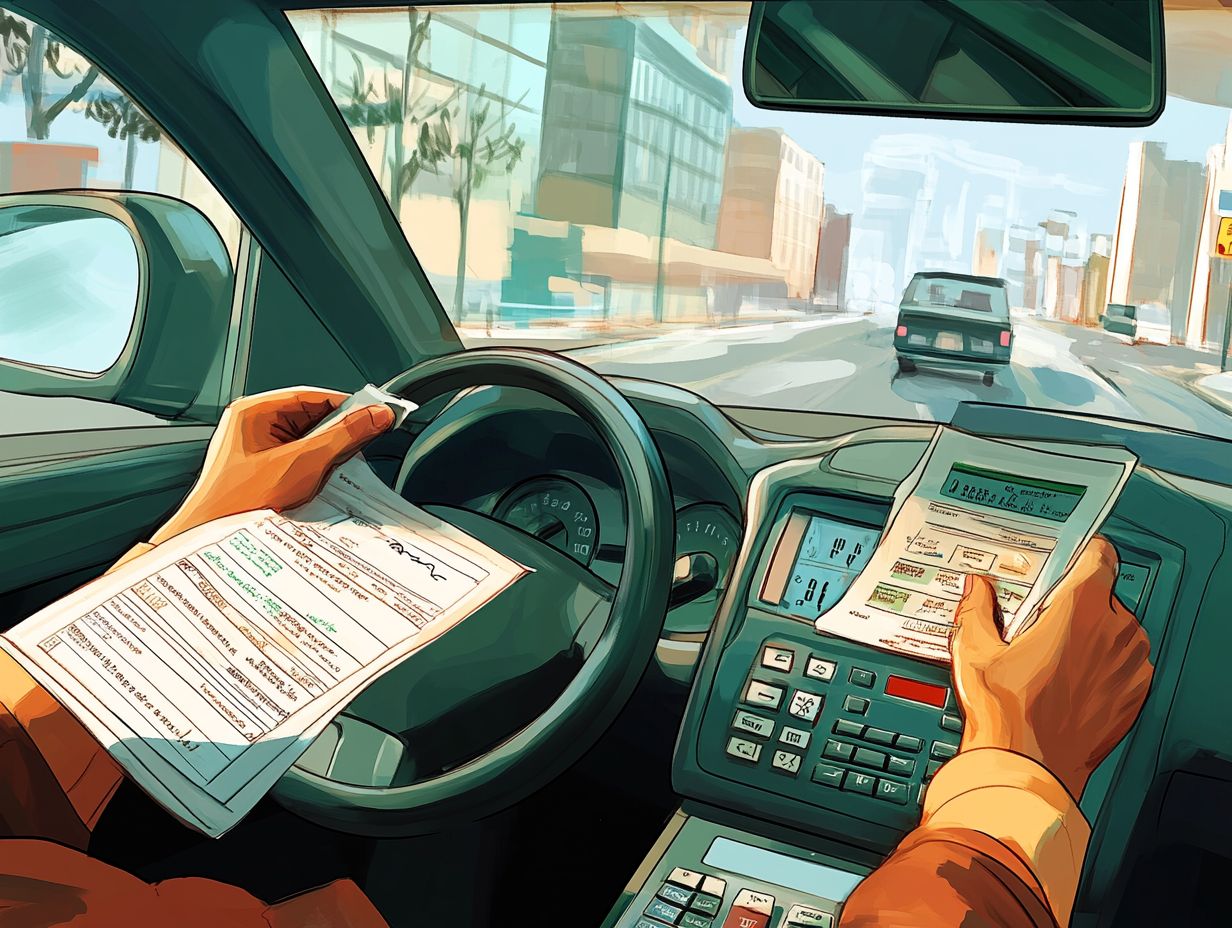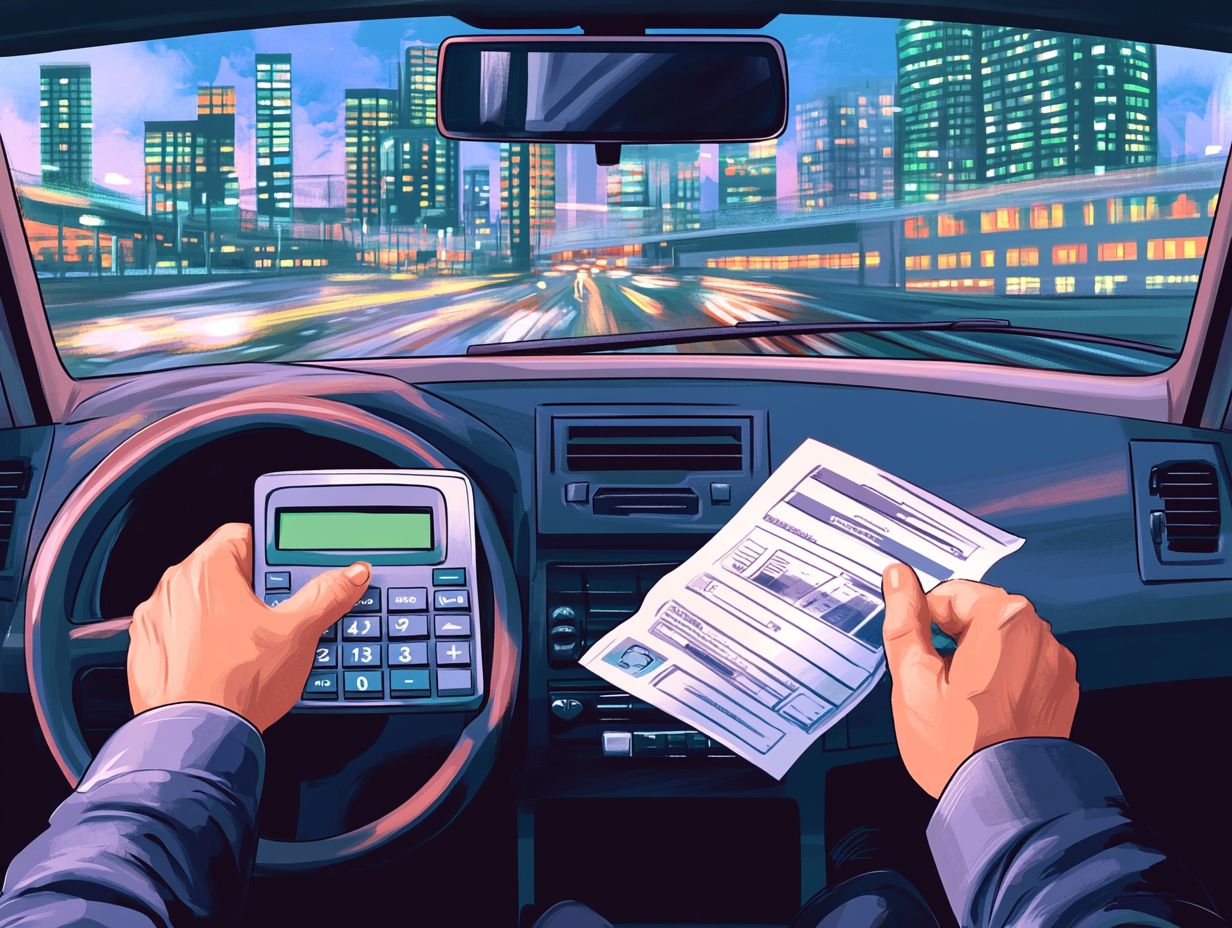The Long-Term Costs of Being a High-Risk Driver
High-risk driving isn t merely a label; it carries substantial implications that ripple through various aspects of your life.
This article delves into the realities of living with this designation, outlining the defining traits of high-risk drivers and the money problems they encounter. You ll gain insight into skyrocketing insurance rates, potential legal fees, and the long-term impact on your employment and personal relationships.
We will also explore strategies to help you mitigate those risky behaviors. Get ready to tackle the tricky world of high-risk driving.
Contents
- Key Takeaways:
- Understanding High-Risk Drivers
- The Financial Impact of Being a High-Risk Driver
- Long-Term Consequences of High-Risk Driving
- Ways to Reduce High-Risk Driving Behavior
- Frequently Asked Questions
- What are the long-term costs of being a high-risk driver?
- How does being a high-risk driver affect my car insurance premiums?
- Can I lower my insurance premiums as a high-risk driver?
- What are some consequences of being a high-risk driver?
- How can I avoid being a high-risk driver?
- What should I do if I am labeled as a high-risk driver?
Key Takeaways:

- High-risk drivers face higher insurance costs and legal fines.
- The long-term consequences of high-risk driving can negatively impact future employment and personal relationships.
- Effective strategies and taking responsibility for one’s actions can help reduce high-risk driving behavior and its associated costs.
Understanding High-Risk Drivers
Understanding high-risk drivers is crucial in the realm of auto insurance. These individuals encounter distinct challenges and penalties that can profoundly impact their insurance rates.
Typically, a high-risk driver is marked by a troubling driving record, which may include traffic violations, at-fault accidents, or even DUI or DWI convictions. These factors lead to elevated premiums and restricted coverage options, positioning them in high-risk categories that insurance providers meticulously assess.
The Financial Impact of Being a High-Risk Driver
The financial impact of being labeled a high-risk driver is significant, often resulting in increased insurance rates that can strain your budget and limit your insurance options. For more information, consider understanding liability coverage for high-risk drivers.
Key factors, including a poor driving record, traffic violations, and past claims, can critically influence your insurance costs. This often results in higher premiums and restricted coverage from different insurance providers.
Increased Insurance Rates
Increased insurance rates commonly result from a thorough risk assessment conducted by insurance providers. This evaluation considers your driving behavior and history, which leads to higher premiums due to factors like traffic violations and at-fault accidents.
These evaluations dive into specific risk factors that can significantly affect your insurability, including the number of speeding tickets you ve accrued and any instances of driving under the influence.
Insurers compare auto insurance quotes from various companies to identify the best pricing based on these evaluations. One major provider might impose a steep rate hike for a history of reckless driving, while another may suggest only a modest increase. This illustrates the variability in how different companies assess risk.
Ultimately, your driving record plays a crucial role in shaping your insurance costs, underscoring the importance of being mindful of your driving habits.
Potential Legal Fees and Fines

Potential legal fees and fines represent a significant financial burden for high-risk drivers, especially in cases involving DUI or DWI convictions. These costs can escalate far beyond just rising insurance premiums.
In addition to court-imposed fines, you often face substantial legal fees for representation, court costs, and various administrative expenses tied to your case. This cumulative financial strain can compel you to forgo essential expenditures.
These legal issues typically lead to higher liability and comprehensive coverage costs. Insurers evaluate the increased risk associated with your driving record. The consequences extend beyond immediate monetary penalties; the looming threat of skyrocketing premiums can create a cycle of financial instability that s difficult to escape.
Long-Term Consequences of High-Risk Driving
The long-term repercussions of high-risk driving reach far beyond immediate financial pressures. They influence multiple facets of your life, including future employment opportunities and personal relationships, making it crucial to explore understanding high-risk driver insurance options.
Employers frequently assess candidates by their driving records. A history marked by traffic violations or DUI convictions can severely restrict your job prospects. The stress from rising insurance rates can strain your relationships, complicating matters further.
Impact on Future Employment and Opportunities
The consequences of high-risk driving on your future employment prospects can be quite serious. Many employers scrutinize driving records during the hiring process, making it crucial for you to maintain a clean driving record.
Consider positions in the transportation sector, such as truck drivers or delivery personnel. In these roles, driving history is especially critical. Similarly, jobs in public service, like emergency responders or bus drivers, can be significantly impacted. A poor driving record might just disqualify you from consideration.
Now is the time to develop strategies to improve your driving behavior. Enrolling in defensive driving courses, which teach safe driving techniques, and strictly adhering to traffic laws can help restore your reputation on the road. Resolving any outstanding violations is also essential.
By taking these steps, you not only enhance your employability in these specific fields but also broaden your opportunities in other sectors that consider driving records during their evaluation processes.
Effect on Personal Relationships
High-risk driving can take a toll on your personal relationships. The stress and financial burdens that come with it often lead to significant strain between you and those you care about. Higher insurance premiums and potential legal issues can create a cycle of anxiety that affects communication and trust within your relationships.
This anxiety might show up in various ways, from increased arguments to a general withdrawal from social interactions. It s crucial to tackle these challenges head-on.
One effective strategy for managing stress is to maintain open communication. Discussing your fears and concerns can foster understanding, allowing your loved ones to offer the support you need. Engaging in relaxation techniques, such as mindfulness or physical exercise, can help you regain a sense of control.
By actively working on these stress reduction methods, you can mitigate the emotional toll and work toward restoring harmony in your relationships. This helps strengthen your support systems when times are tough.
Ways to Reduce High-Risk Driving Behavior

Implementing strategies to mitigate high-risk driving behavior is essential for enhancing your driving record and ultimately reducing insurance rates. This not only positions you to take advantage of available discounts but also opens the door to better coverage options.
Effective approaches include cultivating safer driving habits, carefully following traffic laws, and enrolling in professional driving courses tailored to enrich your driving experience.
Effective Strategies and Resources
There are numerous effective strategies and resources at your disposal if you re a high-risk driver aiming to improve your driving behavior. Advanced driving courses focusing on safety and risk management can be particularly beneficial. Not only will these resources help you refine your skills, but they can also lead to significant insurance discounts, showcasing your commitment to safer driving practices.
In addition to these courses, many local driving schools offer specialized programs designed specifically for high-risk individuals, aligning with various state regulations. You ll also find that online platforms provide interactive modules that you can complete at your convenience, making learning both accessible and flexible.
By engaging in defensive driving techniques and gaining a solid understanding of traffic laws, you can work towards a cleaner driving record. Consistently practicing safe driving habits can help you reduce points on your license, potentially leading to lower insurance premiums. Utilizing these resources gives you the power to not only enhance your skills but also to build confidence behind the wheel.
Start your journey to safer driving today by enrolling in a defensive driving course! Remember, every small change in your driving habits can lead to a safer future for you and your loved ones.
Taking Responsibility for One’s Actions
Taking responsibility for your actions is a crucial step if you’re a high-risk driver looking to change your driving behavior. Acknowledging past mistakes, like traffic violations and DUIs, while actively working to adopt safer habits can set you on the path to a more favorable driving record and insurance landscape.
By embracing personal accountability, you can initiate meaningful changes that elevate road safety for both yourself and those around you. Implementing practical strategies such as enrolling in classes that teach safe driving techniques, regularly reviewing your driving habits, and staying informed about traffic laws allows you to engage in personal growth actively.
Setting realistic goals, like minimizing distractions and steering clear of risky maneuvers, fosters a mindset focused on improvement and safety. Ultimately, by becoming a conscientious driver, you can transform your approach, leading to fewer accidents and greater peace of mind.
Frequently Asked Questions
Here are some common questions about being a high-risk driver and how to improve your situation:
What are the long-term costs of being a high-risk driver?

The long-term costs can include higher insurance premiums, fines and penalties, and potential increases in car repair and maintenance costs, especially when understanding coverage limits for high-risk drivers.
Insurance companies consider high-risk drivers to be more likely to get into accidents, which means they pose a greater financial risk. As a result, insurance premiums for high-risk drivers are typically much higher than those for low-risk drivers.
While it may not be possible to completely eliminate the higher premiums associated with being a high-risk driver, you can take steps to lower them. This can include improving your driving record, taking a defensive driving course, or installing safety features in your car.
What are some consequences of being a high-risk driver?
Being a high-risk driver can also lead to fines and penalties, such as points on your license, license suspension or revocation, and even jail time for more serious offenses.
How can I avoid being a high-risk driver?
The best way to avoid being a high-risk driver is to practice safe driving habits. Follow traffic laws, avoid distractions while driving, and never drive under the influence of drugs or alcohol. Keep your driving record clean to avoid penalties.
What should I do if I am labeled as a high-risk driver?
If you are labeled as a high-risk driver, take responsibility for your actions and work towards improving your driving habits. This can include taking defensive driving courses, seeking professional help for any underlying issues that may be contributing to your risky driving behavior, and maintaining a clean driving record going forward.





